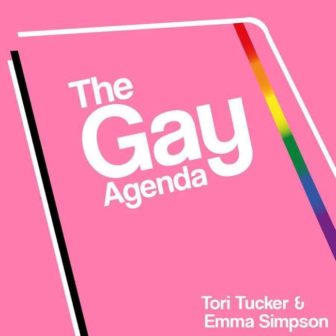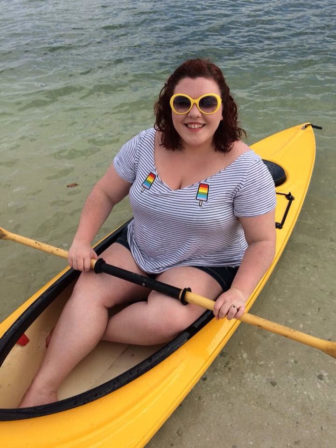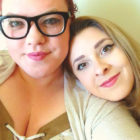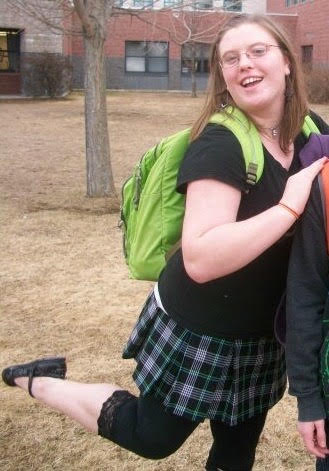 By Emma Simpson
By Emma Simpson
It was the sixth grade and I was sitting on the bus home in my bootcut jeans (which were in style then, I will have you know) and my low-cut top that I always fought with my mom about wearing to school.
I wore feminine accessories; bows in my hair, pink lipstick, Claire’s jewelry that I bought on sale, etc. A girl sitting in the seat next to me began making lewd comments about a boy playing some shirtless sport outside and when my gut reaction of discomfort was to say “ew,” she turned to me, rolled her eyes, and spat out, “What are you, a lesbian?”

Emma Simpson these days on vacation in Florida
Although I responded “No, I’m just eleven!” with no hesitation, my heart was pounding. (Good comeback, but I have some news for my eleven-year-old self.)
Looking back on this time in my life, I can recognize that the reason I was so terrified of being labelled a lesbian was partly because I’m actually really, really gay, but for some reason I thought then that being a lesbian would make me ugly. Why? Because when women don’t conform to gender norms, especially in regards to appearance, people go nuts. People are so uncomfortable when someone doesn’t conform to society’s expectations of them that they douse these people in negative and hurtful comments.
I have always leaned toward more “girly” tendencies, but I won’t pretend that this isn’t because society trained me this way. I embrace my identity as a “lipstick lesbian” (a term used to refer to a gay or queer woman who presents very femininely), but I also acknowledge that this has a lot to do with gender policing that happens to everyone from a very young age, regardless of gender.
And the worst part is that this whole gender-presentation thing is a double-edged sword (particularly for queer women): if you’re very feminine, people say things like, “but she’s too pretty to be gay!” But if you don’t necessarily conform to traditional standards of femininity, they’ll say, “well obviously she’s a lesbian.” This can lead to a lot of confusion and frustration, as I know it has for me.
As a queer woman and a feminist scholar, I have had moments where I’ve been hypercritical of my own gender performance. Am I putting this lipstick on because I like it or because society tells me that I need to look pretty to be valuable? Am I harming other women, specifically those who are LGBTQ, by adhering to some of the ideals of femininity that society so violently reinforces?

Emma Simpson, left, and Tori Tucker
I feel this way in part because unfortunately, different LGBTQ identities are not accurately represented in most forms of media, and representation of women who are LGBTQ often falls at either end of a widely varied spectrum: hyper-feminine or very unfeminine. This leads to lesbian and bisexual women being unfairly hypersexualized while simultaneously painted as unattractive (the triteness and falsehood of LGBTQ women who claim a more butch identity constantly hitting on straight girls for comedic effect is rampant in forms of media even today).
Transgender women are often specifically targeted with this gender policing, with people focusing on whether or not they “pass” as the gender they identify with, which is harmful – people should be able to express themselves however they choose regardless of gender identity or orientation.
The reality is that, just like all other women, LGBTQ women are all wonderfully unique. There’s no way to lump us all into one category because, surprise, we’re people. There are LGBTQ women who are very feminine, who aren’t feminine at all, and those who fall at every nonexistent marker in between.
The fear I felt as an insecure sixth grader at the potential of being labelled a lesbian was a product of internalized homophobia ingrained in me by a society that deems anything it doesn’t fully understand to be ugly, and although it is very important to note that no one should be judged based on their physical appearance, this can be really hurtful.
LGBTQ ladies should be able to celebrate our diverse identities (and see ourselves represented in media.) without fear of gender policing or harassment.
As my sixth grade self who was obsessed with Dr. Seuss would say, “Today you are you, that is truer than true. There is no one alive who is you-er than you!”
Tori Tucker and Emma Simpson are Keene State College students who work on the column The Gay Agenda together. It is posted every Sunday at InDepthNH.org

Tori Tucker
Tori Tucker was born and raised in Portsmouth, New Hampshire. She is a student, author, and activist, and is currently in her senior year at Keene State College where she is finishing her English-Writing BA. In addition to being a writing student Tori also is pursuing minors in music and German.

Emma Simpson
Emma Simpson is a Women’s and Gender Studies major currently in her junior year at Keene State College. She is the vice president of her campus a cappella group and involved with Planned Parenthood as a volunteer.






